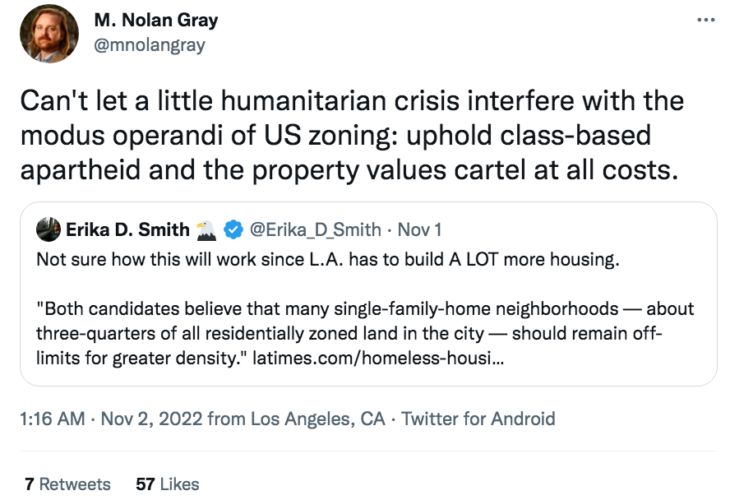This tweet caught my eye:

I prefer the glass half full (or more precisely one fourth full) interpretation. Especially if the glass is very large. And LA is an exceedingly large glass, comprising 502 square miles of land. That means there is roughly 125 square miles of non-residentially zoned land, more than five times larger than Manhattan (which is 23 square miles.) Even though I’d prefer no zoning at all, I’m actually quite pleased to hear both candidates support much more housing in non-residential portions of LA.
Residential zoning is a huge problem, but it’s far from the only problem when it comes to housing construction in California. Almost as important is the excessively restrictive regulations on building new housing anywhere in the city, which make new housing construction much more expensive than it would be in a free market, or even in a less tightly regulated market like Chicago.
Consider the following two facts:
1. In recent years, California has been experiencing a net out-migration of residents.
2. Most of California is run by progressive governments with highly dysfunctional policies in areas such as taxes, business regulation, crime and education.
You might assume that those facts are closely related. In fact, almost the entire net population outflow is due to bad housing policies. If California simply deregulated housing, its population might grow almost as fast as in Texas and Florida. Given the extremely high prices here, the construction of new housing would be enormously profitable if not constrained by regulation.
I live in Orange County, one of the few places in California that is not poorly governed. It also has a nice climate. And yet the county is now actually losing population. Irvine is the only Orange County community that is still growing rapidly. That’s not because it’s better governed than the other OC cities, rather it is one of the few that still allows substantial home building.
Republicans like to criticize the ineffective progressive governance in most of this state. And yet, even if all of the problems they correctly cite were fixed—if California were to become as business friendly as Texas and Florida—it would do little to stem the outflow of population from coastal California (although it would help the Central Valley.) Unfortunately, some Republicans refuse to embrace the deregulation of housing, and at the national level the GOP is gradually shifting in a NIMBY direction.


READER COMMENTS
Spencer
Nov 3 2022 at 9:44am
re: “the construction of new housing would be enormously profitable if not constrained by regulation”
Big crisis. A source of income inequality, the GINI index – “the distribution of income between the main factors of production: land, labour and capital”.
If you raise the administered rates, you cut back on residential housing construction. That’s operating in reverse. New construction is part and parcel with R-gDp, not inflation.
To cut inflation, you hold constant the means-of-payment money supply, in this case, for at least 3 years.
Jeremy Goodridge
Nov 3 2022 at 10:44am
You say: “In fact, almost the entire net population outflow is due to bad housing policies. ”
Can you provide some evidence to prove this point?
Scott Sumner
Nov 3 2022 at 12:22pm
There are two facts that point to this conclusion:
California housing is extremely expensive, often twice the price of similar housing in other states. That suggests that (at the margin) people view California as an extremely desirable place to live, and that if more houses were built then they would become occupied, not stand empty. That’s just S&D 101.
Many studies suggest that regulation is the primary cause of high house prices in California. Take an ordinary 10,000 sq. foot lot. That piece of land has a far higher market value if zoned for multifamily than for single family. Change the zoning and more housing would be built. Other studies show that the cost of regulations (environmental impact, etc.) make multifamily construction far more expensive in California than in most other states.
John Hawkins
Nov 4 2022 at 3:30pm
I think it is pretty hard to disentangle the housing prices from the other reasons people like to live there – on net, if California had lower housing prices because it had a bajillion apartment complexes everywhere, would people still conceptually prefer it (to say nothing of premium-price-adjusted preferring it) to, say, Texas? Or to New York state?
Just saying, I think this is an especially thorny one for the “ceteris paribus” assumption
Kevin Erdmann
Nov 4 2022 at 5:12pm
John,
Housing production in California is well below the national average, and is even lower than depopulating rust belt metro areas on a per capita basis.
For any other explanation to be plausible, the California cities would need to, even for a little while, approve new units at nearly the rate of a Dallas or Kansas City. They aren’t even close. Why would you default to any other explanation?
Mark Brophy
Nov 5 2022 at 10:30pm
A government that prevents people from constructing housing is tyrannical. If California government were clean and efficient, many more people would live there and the population would grow fast. After all, the climate is better than the other 49 states.
Jeremy Goodridge
Nov 3 2022 at 10:47am
You say: “In fact, almost the entire net population outflow is due to bad housing policies”
Can you provide some evidence for this statement?
Thank you.
Jeremy Goodridge
Nov 3 2022 at 4:57pm
Hi scott
Thanks for your answer. But what I was asking is not evidence for whether housing costs are higher in CA or even whether the cause of higher prices is more housing regulation but rather whether it’s housing policy vs tax, business regulation, covid policy that are finally driving ca population down. Clearly people want to live in CA despite all these negatives — otherwise people would have left many years earlier. But what has caused the recent population decline? Is it ONLY housing policy — that’s what I read you to be claiming. And I just don’t see evidence for that strong position.
In the recent census report there was pop decline in CA, NY and IL and rises in TX and FL. Is that decline in CA all due to housing policy? Why in this recent census report? Did housing policy suddenly get a lot worse? Or housing prices suddenly rise? What about other states?
Scott Sumner
Nov 3 2022 at 6:27pm
“Is it ONLY housing policy — that’s what I read you to be claiming. ”
That’s not exactly what I said. I’d say that over the long run it’s more than 90% housing policy, but in the short run you can get changes in occupancy, as with Covid. Ultimately, however, the population mostly depends on the housing supply.
Jeremy Goodridge
Nov 3 2022 at 5:07pm
Hi Scott
My comment was more directed at why housing policy alone (vs regulation, taxes, covid policy , spending) is responsible for the net decline in population in CA in the last census report (in contrast to previous census reports). That’s what I read your piece to be asserting. Is there convincing evidence for that claim?
A similar question could be asked about NY and IL, also states that showed recent pop declines. And FL and TX, states with pop increases.
Jeremy Goodridge
Nov 3 2022 at 5:09pm
Not sure why my posts initially don’t show up. Then I rewrite them and then both posts show up.
Sorry!!
Spencer
Nov 4 2022 at 9:17am
There have been 12 boom/busts mistakes in real estate solely caused by the FED since WWII.
David S
Nov 5 2022 at 3:12am
The enshrinement of single family zoning restrictions across 4/5ths of a metropolitan region would have a chilling effect on housing construction even if there’s massive upzoning (or dezoning) of the remaining 1/5th. The single family zones are “dead zones” that prevent densification because they discourage agglomeration effects in commercial and residential districts. The single family neighborhoods will also inevitably wield outsized political power that prevents infrastructure improvements for the region.
This played out in the Boston metro region from the 1890’s through the 1960’s. The failure of large parts of Brookline and Newton to become real cities continues to have profoundly negative effects on housing costs and traffic.
Mark Brophy
Nov 5 2022 at 10:40pm
What happened in Brookline and Newton? Zoning wasn’t popular before WWII.
David S
Nov 6 2022 at 9:10am
Mark,
Regulations and customs that were similar to zoning that protected wealthy landowners were in effect during this period. The most significant event was the failure of Boston to annex Brookline in 1873–largely because of the political power of residents there. This coincided with improvements in transportation–streetcars, then cars–that encouraged lower density development. Zoning codes, when they finally implemented in these established communities, tended to solidify settlement patterns. (I should have moved my date range back further….)
It all seemed like a good idea at the time. I seethe about this when I sit in traffic.
Scott Sumner
Nov 6 2022 at 12:53pm
If you think Newton’s bad, check out Weston and Lincoln!
Mark Brophy
Nov 5 2022 at 8:29pm
Irvine is the best governed city in Orange County because it’s the only one that allows housing to be constructed.
Scott Sumner
Nov 6 2022 at 12:53pm
OK, in that sense you are correct.
Comments are closed.